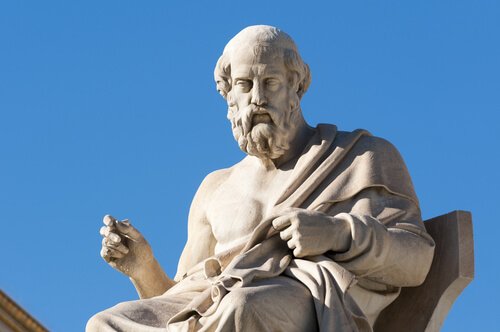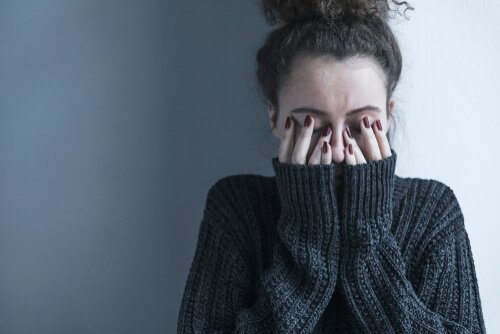The Ancient Greek Cure for Depression and Anxiety


Written and verified by the psychologist Valeria Sabater
The Ancient Greek cure for depression and anxiety is based on an interesting holistic approach, a well-known lifestyle known as “bios pythagorikos”. This lifestyle is related to healthy habits, diet, exercise, and, particularly, mental development. Tending to the body and mind were key elements to human well-being, according to Greek culture.
We may find these principles to be somewhat old-fashioned today. But, as a society, we’re at a point where what we need the most is to go back to basics. We need to make our daily lives less complicated, forget about our worries, get rid of excess stimuli, and focus on our priorities.
Greek philosophy
In a world where technology crushes each one of our individual universes, it’s interesting to recall the purpose of philosophy. Thinkers such as Plato, Aristotle, and Pythagoras didn’t only write about morality, ethics, and aesthetics.
We also learned about the art of “good living” from them. In this sense, the ultimate goal of philosophy is to exercise our minds and learn to think for ourselves. This is an essential concept that, in the long run, allows us to invest in our well-being.
“Positive health requires a knowledge of man’s primary constitution and of the powers of various foods, both those natural to them and those resulting from human skill. But eating alone is not enough for health. There must also be exercise, the effects of which must likewise be known.”
-Hippocrates-

What’s the Greek cure for anxiety and depression?
Nicholas Kardaras is a clinical psychologist known for his work in mental health, addictions, and the impact of technology in our era. One of his most successful books is How Plato and Pythagoras Can Save Your Life: The Ancient Greek Prescription for Health and Happiness. In this book, which was presented at an American Psychological Association (APA) conference, he proposed the following ideas:
- Today, depression and anxiety have become two major health issues. Furthermore, the World Health Organization (WHO) estimates that by the year 2030, these will be the main health-related issues.
- Recent studies such as the one carried out at King’s College London indicate that between 30% and 40% of depression and anxiety is genetic and that 60% to 70% is caused by environmental factors.
- Dr. Nicholas Kardaras also pointed out another interesting fact. These psychological disorders don’t just manifest due to our industrial, urban lifestyles. We’re also losing our existential priorities and our purpose. Nowadays, we seek happiness in planned obsolescence products.
We’re isolating ourselves more and more every day. Although we’re a hyperconnected society, we feel lonelier than ever.

Studies like the one carried out by Dr. Stephen Ilardi, a psychologist from the University of Kansas, have revealed very interesting facts. Depression doesn’t manifest in groups such as the Kaluli people of Papua New Guinea. Their life philosophy is very simple and they’re very happy.
We have the ancient Greek cure for depression within our reach, the one that Pythagoras spoke of back in his day known as the “bios pythagorikos”. Let’s see what it’s all about.
A diet rich in omega-3 fatty acids
Foods such as walnuts, olive oil, salmon, and chia seeds contain omega-3 fatty acids. Interestingly, many new studies have revealed that this fatty acid acts as an authentic neuroprotective agent.
Regular exercise
Gymnasiums in Ancient Greece were institutions dedicated to physical and spiritual instruction. Therefore, one discipline was related to the other. These days, we often neglect the importance of physical exercise, staying active, and connecting with our environment, nature, and ourselves.
Sunlight
This is one of the main keys of the Greek cure for depression. If we think about it, we don’t even see the sun that much these days. We’re surrounded by artificial lights at our jobs packed with electronic devices. This type of light directly affects our ability to rest and, consequently, our health. Thus, we should sunbathe as much as we can.

Do things that distract you from negative feelings
The Greeks treasured everything that lead to enjoyment and relaxation and focused the things that made them forget about their worries. By this we’re not saying that you have to practice hedonism. However, you should definitely learn to enjoy the time you can spend doing what you like. You have to allow yourself to be free, happy, and creative.
Dialectics as a cure for depression and anxiety
Dialectics is the art of confronting, listening, debating, relativizing, learning, renewing ideas, and discovering purposes. More than anything, it implies enriching ourselves with social contacts who can enlighten us with their perspectives, people who can challenge us with their energy, vitality, and optimism.
The Greek cure for depression and anxiety is an invitation to lead a new lifestyle. It can help us boost our well-being.
The Ancient Greek cure for depression and anxiety is based on an interesting holistic approach, a well-known lifestyle known as “bios pythagorikos”. This lifestyle is related to healthy habits, diet, exercise, and, particularly, mental development. Tending to the body and mind were key elements to human well-being, according to Greek culture.
We may find these principles to be somewhat old-fashioned today. But, as a society, we’re at a point where what we need the most is to go back to basics. We need to make our daily lives less complicated, forget about our worries, get rid of excess stimuli, and focus on our priorities.
Greek philosophy
In a world where technology crushes each one of our individual universes, it’s interesting to recall the purpose of philosophy. Thinkers such as Plato, Aristotle, and Pythagoras didn’t only write about morality, ethics, and aesthetics.
We also learned about the art of “good living” from them. In this sense, the ultimate goal of philosophy is to exercise our minds and learn to think for ourselves. This is an essential concept that, in the long run, allows us to invest in our well-being.
“Positive health requires a knowledge of man’s primary constitution and of the powers of various foods, both those natural to them and those resulting from human skill. But eating alone is not enough for health. There must also be exercise, the effects of which must likewise be known.”
-Hippocrates-

What’s the Greek cure for anxiety and depression?
Nicholas Kardaras is a clinical psychologist known for his work in mental health, addictions, and the impact of technology in our era. One of his most successful books is How Plato and Pythagoras Can Save Your Life: The Ancient Greek Prescription for Health and Happiness. In this book, which was presented at an American Psychological Association (APA) conference, he proposed the following ideas:
- Today, depression and anxiety have become two major health issues. Furthermore, the World Health Organization (WHO) estimates that by the year 2030, these will be the main health-related issues.
- Recent studies such as the one carried out at King’s College London indicate that between 30% and 40% of depression and anxiety is genetic and that 60% to 70% is caused by environmental factors.
- Dr. Nicholas Kardaras also pointed out another interesting fact. These psychological disorders don’t just manifest due to our industrial, urban lifestyles. We’re also losing our existential priorities and our purpose. Nowadays, we seek happiness in planned obsolescence products.
We’re isolating ourselves more and more every day. Although we’re a hyperconnected society, we feel lonelier than ever.

Studies like the one carried out by Dr. Stephen Ilardi, a psychologist from the University of Kansas, have revealed very interesting facts. Depression doesn’t manifest in groups such as the Kaluli people of Papua New Guinea. Their life philosophy is very simple and they’re very happy.
We have the ancient Greek cure for depression within our reach, the one that Pythagoras spoke of back in his day known as the “bios pythagorikos”. Let’s see what it’s all about.
A diet rich in omega-3 fatty acids
Foods such as walnuts, olive oil, salmon, and chia seeds contain omega-3 fatty acids. Interestingly, many new studies have revealed that this fatty acid acts as an authentic neuroprotective agent.
Regular exercise
Gymnasiums in Ancient Greece were institutions dedicated to physical and spiritual instruction. Therefore, one discipline was related to the other. These days, we often neglect the importance of physical exercise, staying active, and connecting with our environment, nature, and ourselves.
Sunlight
This is one of the main keys of the Greek cure for depression. If we think about it, we don’t even see the sun that much these days. We’re surrounded by artificial lights at our jobs packed with electronic devices. This type of light directly affects our ability to rest and, consequently, our health. Thus, we should sunbathe as much as we can.

Do things that distract you from negative feelings
The Greeks treasured everything that lead to enjoyment and relaxation and focused the things that made them forget about their worries. By this we’re not saying that you have to practice hedonism. However, you should definitely learn to enjoy the time you can spend doing what you like. You have to allow yourself to be free, happy, and creative.
Dialectics as a cure for depression and anxiety
Dialectics is the art of confronting, listening, debating, relativizing, learning, renewing ideas, and discovering purposes. More than anything, it implies enriching ourselves with social contacts who can enlighten us with their perspectives, people who can challenge us with their energy, vitality, and optimism.
The Greek cure for depression and anxiety is an invitation to lead a new lifestyle. It can help us boost our well-being.
All cited sources were thoroughly reviewed by our team to ensure their quality, reliability, currency, and validity. The bibliography of this article was considered reliable and of academic or scientific accuracy.
- Kardaras, Nicholas (2011) How Plato and Pythagoras Can Save Your Life. New York: Conari
This text is provided for informational purposes only and does not replace consultation with a professional. If in doubt, consult your specialist.







